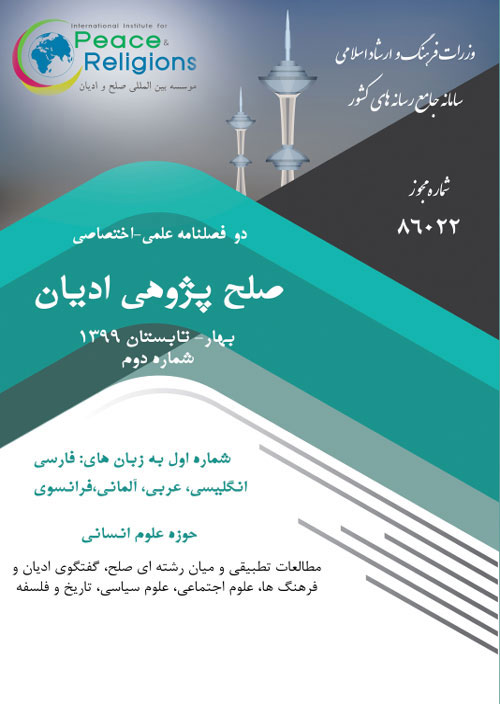فهرست مطالب

Journal of Peace Studies of Religions
Volume:1 Issue: 3, Spring-Summer 2021
- تاریخ انتشار: 1400/04/08
- تعداد عناوین: 7
-
Page 7
-
Pages 11-20
This paper discusses the art of conducting interfaith dialogue. Interfaith dialogue as an important factor of social and interfaith stability is subject to numerous obstacles today. In this paper, the focus is on art as a link between conversation and its realization. Many religious topics and issues are also global topics. We can instictively confirm that sincerely believing people make this world authentic, creative unpredictable. Noble speech is the basis of behavior, while behavior is the source of many virtues. Discussiog about culture, art and beauty in diversity represents an act of cultivating interfaith trust. The Art of Speech is like sacred art, sprinkled with the mystique of echoes that appear in the pauses between speeches. Title of the paper "The Art of Interfaith Dialogue" comes from deep belief and respect that God is the only artist and we inherit all the artistic qualitis necessary for dialogue and peacebuilding from him. Speech skills and the beauty of thoughts are the two main skills in the connection between art and dialogue.
Keywords: Art, Authenticity, Interfaith Dialogue, Human, Diversity -
Pages 21-48
Islam is one of the largest religions in the world and it is estimated that there are more than one billion Muslims around the world. Even though Islam is the fastest growing religion in the world2 , Islamophobia is a significant problem across the world. The widely used term “Islamization” refers to anything that relates to Muslims. This includes a female wearing the hijab, Halal products on supermarket shelves, the opening of new mosques, and marriage counselling by community and religious leaders1 . In Australia islamophobia rose after 20012 however, it has been concealed in recent years, and creating an increasingly unwelcome environment for Australian Muslims despite of its multiculturism. This paper discovers the image of Muslims and Islam in Australia and the cause and effect of increasing marginalisation of Muslim community due to the stereotyping, government policies and officials’ statements.
Keywords: Islam, Islamophobia, Australia -
Pages 49-58
The development of a nation depends on its ability to work together. Social dialogue and Sustainable development has a close relationship with each other. People believe that live as a community together is important. Though there are other community people living among us, we are also reponsible to show love and peace. For this reason, we need dialogue among societies so that we may work together for a sustainable development. Dialogue helps us to identify problems, take initiative and fulfill towards the main goal. We need to understand that without dialogue with other societes (like Hindus, Muslims, Christians, Jews etc), it is impossible to sustain any development in a country. A successful dialogue among societies can sustain a country’s development, If they are able to overcome in the field of social development and infrustructure development.
Keywords: Social Dialouge, Development, Sustainable Development -
Pages 59-65
The importance of inter-religious dialogue as a form of growth and understanding not only for one’s self and their effect on humanity, but to continue to share personal growth with others to bear fruit for humanity. By growing spiritually, morally and intellectually individuals from different faiths can bond over being humans and creations of the ultimate Creator. Gaining knowledge and wisdom only allows for spiritual growth and acceptance of others. As Imam Ali (as) has said, “If a person is not your brother in faith, he is your equal in humanity.”
Keywords: Personal Development, Spiritual Development, Moral Development, Fruitful Dialogue, Inter-religious Dialogue, Dialogue Exchange -
Pages 67-72
Analyses are developed with historical and socio-cultural perspectives. Several patterns of multiculturalism in Islamic civilization are found: Firstly, during the Prophet and early Caliphs era, Islam–as a doctrine and religion system–had accomodative patterns to the cultural form in tribal tradition and began to perform as Arabic culture-based civilization. Secondly, during the Muslim Civilization, disregarding that the civilization was developed using Arabic politics, the policies regarding Islamic expansion encouraged acculturation of Arabic-Muslim and non-Arabic or non Muslim communities, leading to the multiculturalism in Islam at that time. Finally, during the Muslim Civilization era, multiculturalism became more obvious as a pattern of Islamic civilization, indicated by the roles of nonArabic cultures in Islamic civilization development.
Keywords: Islam, Multi-Cultural Community, Muslim Civilization -
Pages 73-85
A religion-based state is a system based on religious beliefs and values. Its objective should be to create a favorable environment for the growth of moral virtues, based on faith and piety and to struggle against all forms of vice and corruption; the abolition of all forms of undesirable discrimination and the provision of equitable opportunities for all, in both the material and the intellectual spheres; securing the multifarious rights of all citizens – both women and men- and providing legal protection for all, as well as the equality of all before the law; the expansion and strengthening of religious brotherhood and public cooperation among all the people; the elimination of all forms of despotism and autocracy and all attempts to monopolize power; the complete elimination of imperialism and the prevention of foreign influence. In addition, it must ensure political and social freedoms within the framework of the law; the participation of the entire people in determining their political, economic, social, and cultural destiny; the planning of a correct and just economic system, in accordance with religious criteria, in order to create welfare, eliminate poverty, and abolish all forms of deprivation with respect to food, housing, work, health care, and the provision of social insurance for all; framing the foreign policy of the country on the basis of religious criteria, fraternal commitment to all believers, and unsparing support to the freedom fighters of the world and negation of all forms of oppression, both the infliction of and the submission to it, and of dominance, both its imposition and its acceptance.
Keywords: Religion, State, Religion-based State, Monotheism, Justice

